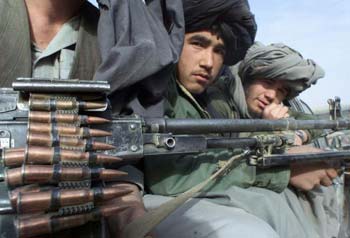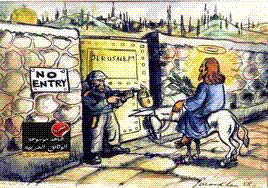 The Taliban began their spring campaign as a British lord put a price on Bush's scalp, notes Eric Walberg
The Taliban began their spring campaign as a British lord put a price on Bush's scalp, notes Eric Walberg
Kabul was cast into chaos Sunday as the Taliban began their spring offensive with attacks on US, British, German and Russian embassies, NATO headquarters, Camp Eggers, a hotel, President Karzai’s palace compound and parliament. “These are coordinated attacks that went just as we planned,” Taliban spokesman Qari Talha told The Daily Beast. “This is only the start of what’s in store this year and next for the Americans and Karzai.”
Middle East
AfPak: Mutiny on the Bounty
- Written by Eric Walberg Эрик Вальберг/ Уолберг إيريك والبرغ
Flytilla: Israel’s real Easter pilgrims
- Written by Eric Walberg Эрик Вальберг/ Уолберг إيريك والبرغ
 Easter celebrates suffering and compassion. Alhamdulillah, these human traits were on display on Easter Sunday at European airports and in the Holy Land, reports Eric Walberg
Easter celebrates suffering and compassion. Alhamdulillah, these human traits were on display on Easter Sunday at European airports and in the Holy Land, reports Eric Walberg
Ben Gurion Airport was thrown into chaos for the third annual Flytilla on Sunday. As starry-eyed tourists arrived to visit the Holy sites and beady-eyed new Israelis arrived to kick more Palestinians off their land in the name of the Jewish State, thousands of Westerners with a sense of conscience presented their air tickets to suspicious officials in Europe and -- if they were lucky -- their passports in Tel Aviv, and held their breath.
BDS update: Israel’s Ides of March
- Written by Eric Walberg Эрик Вальберг/ Уолберг إيريك والبرغ
Palestinian Land Day and Israel Apartheid Week activities around the world gave Israel and its Western backers something to think about in recent weeks, reports Eric Walberg
BDS update: Peaceful blitzkreig and Israeli counterattacks
- Written by Eric Walberg Эрик Вальберг/ Уолберг إيريك والبرغ
 BDS
activities are moving into a new critical stage, with apostasy,
Internet hacking, regattas, and an ever more aggressive Israel and its
acolytes upping the perilous ante, reports Eric Walberg
BDS
activities are moving into a new critical stage, with apostasy,
Internet hacking, regattas, and an ever more aggressive Israel and its
acolytes upping the perilous ante, reports Eric Walberg
The
Third Annual BDS Conference opened 17 December at Hebron’s Children’s
Happiness Centre, “to expand Palestinian civil society’s active
implementation of BDS that is deeply rooted in the Palestinian
struggle.” European BNC coordinator Michael Deas affirmed, “BDS is now
the main framework for solidarity. We are very close to closing the
European market to Israel.”
A boycott bombshell in January was dropped by an 11th-grade American Jewish teenager, Jesse Lieberfeld, who won Dietrich College’s 2012 Martin Luther King, Jr Writing Award for his essay about his moral awakening when he realised his American Jewish culture was unavoidably identified with supporting Israel.
The Afghan dust is settling
- Written by Eric Walberg Эрик Вальберг/ Уолберг إيريك والبرغ
Yes, it really is another Vietnam, and just as in 1972, presidential elections will make no difference, concludes Eric Walberg
Scarcely a word is heard about foreign affairs amid US election talk, despite the many fires around the world that the US military is either stoking or trying to douse -- depending on your point of view. Other than Republican contender Ron Paul -- not a serious candidate for the mainstream -- no one questions the plans for war on Iran, Israel’s continued expansion in the Occupied Territories, or US plans to end the Iraq and Afghanistan wars.
More Articles...
Page 27 of 39





